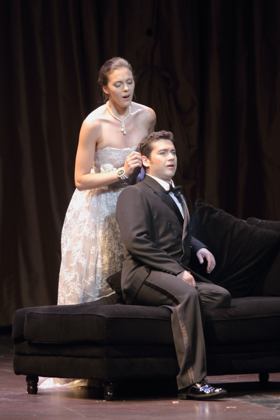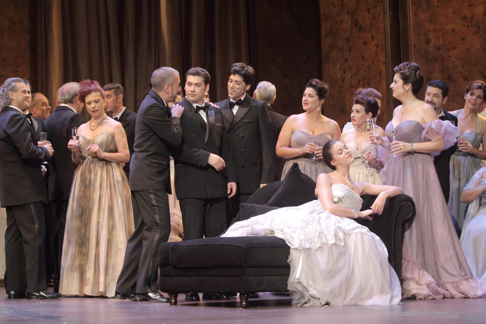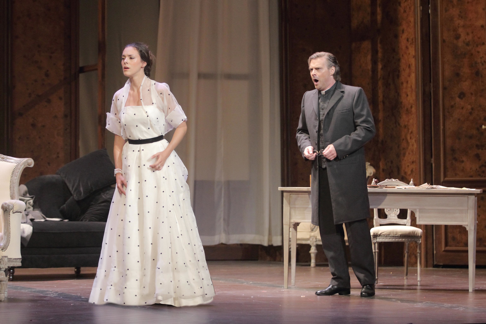
26 Jun 2014
La Traviata in Marseille
It took only a couple of years for Il trovatore and Rigoletto to make it from Italy to the Opéra de Marseille, but it took La traviata (Venice, 1853) sixteen years (Marseille, 1869).
English Touring Opera are delighted to announce a season of lyric monodramas to tour nationally from October to December. The season features music for solo singer and piano by Argento, Britten, Tippett and Shostakovich with a bold and inventive approach to making opera during social distancing.
This tenth of ten Live from London concerts was in fact a recorded live performance from California. It was no less enjoyable for that, and it was also uplifting to learn that this wasn’t in fact the ‘last’ LfL event that we will be able to enjoy, courtesy of VOCES8 and their fellow vocal ensembles (more below …).
Ever since Wigmore Hall announced their superb series of autumn concerts, all streamed live and available free of charge, I’d been looking forward to this song recital by Ian Bostridge and Imogen Cooper.
The Sixteen continues its exploration of Henry Purcell’s Welcome Songs for Charles II. As with Robert King’s pioneering Purcell series begun over thirty years ago for Hyperion, Harry Christophers is recording two Welcome Songs per disc.
Although Stile Antico’s programme article for their Live from London recital introduced their selection from the many treasures of the English Renaissance in the context of the theological debates and upheavals of the Tudor and Elizabethan years, their performance was more evocative of private chamber music than of public liturgy.
In February this year, Albanian soprano Ermonela Jaho made a highly lauded debut recital at Wigmore Hall - a concert which both celebrated Opera Rara’s 50th anniversary and honoured the career of the Italian soprano Rosina Storchio (1872-1945), the star of verismo who created the title roles in Leoncavallo’s La bohème and Zazà, Mascagni’s Lodoletta and Puccini’s Madama Butterfly.
Evidently, face masks don’t stifle appreciative “Bravo!”s. And, reducing audience numbers doesn’t lower the volume of such acclamations. For, the audience at Wigmore Hall gave soprano Elizabeth Llewellyn and pianist Simon Lepper a greatly deserved warm reception and hearty response following this lunchtime recital of late-Romantic song.
Collapsology. Or, perhaps we should use the French word ‘Collapsologie’ because this is a transdisciplinary idea pretty much advocated by a series of French theorists - and apparently, mostly French theorists. It in essence focuses on the imminent collapse of modern society and all its layers - a series of escalating crises on a global scale: environmental, economic, geopolitical, governmental; the list is extensive.
For this week’s Live from London vocal recital we moved from the home of VOCES8, St Anne and St Agnes in the City of London, to Kings Place, where The Sixteen - who have been associate artists at the venue for some time - presented a programme of music and words bound together by the theme of ‘reflection’.
'Such is your divine Disposation that both you excellently understand, and royally entertaine the Exercise of Musicke.’
Amongst an avalanche of new Mahler recordings appearing at the moment (Das Lied von der Erde seems to be the most favoured, with three) this 1991 Mahler Second from the 2nd Kassel MahlerFest is one of the more interesting releases.
‘And there was war in heaven: Michael and his angels fought against the dragon; and the dragon fought and his angels, And prevailed not; neither was their place found any more in heaven … that old serpent … Satan, which deceiveth the whole world: he was cast out into the earth, and his angels were cast out with him.’
If there is one myth, it seems believed by some people today, that probably needs shattering it is that post-war recordings or performances of Wagner operas were always of exceptional quality. This 1949 Hamburg Tristan und Isolde is one of those recordings - though quite who is to blame for its many problems takes quite some unearthing.
There was never any doubt that the fifth of the twelve Met Stars Live in Concert broadcasts was going to be a palpably intense and vivid event, as well as a musically stunning and theatrically enervating experience.
‘Love’ was the theme for this Live from London performance by Apollo5. Given the complexity and diversity of that human emotion, and Apollo5’s reputation for versatility and diverse repertoire, ranging from Renaissance choral music to jazz, from contemporary classical works to popular song, it was no surprise that their programme spanned 500 years and several musical styles.
The Academy of St Martin in the Fields have titled their autumn series of eight concerts - which are taking place at 5pm and 7.30pm on two Saturdays each month at their home venue in Trafalgar Square, and being filmed for streaming the following Thursday - ‘re:connect’.
The London Symphony Orchestra opened their Autumn 2020 season with a homage to Oliver Knussen, who died at the age of 66 in July 2018. The programme traced a national musical lineage through the twentieth century, from Britten to Knussen, on to Mark-Anthony Turnage, and entwining the LSO and Rattle too.
With the Live from London digital vocal festival entering the second half of the series, the festival’s host, VOCES8, returned to their home at St Annes and St Agnes in the City of London to present a sequence of ‘Choral Dances’ - vocal music inspired by dance, embracing diverse genres from the Renaissance madrigal to swing jazz.
Just a few unison string wriggles from the opening of Mozart’s overture to Le nozze di Figaro are enough to make any opera-lover perch on the edge of their seat, in excited anticipation of the drama in music to come, so there could be no other curtain-raiser for this Gala Concert at the Royal Opera House, the latest instalment from ‘their House’ to ‘our houses’.
"Before the ending of the day, creator of all things, we pray that, with your accustomed mercy, you may watch over us."

It took only a couple of years for Il trovatore and Rigoletto to make it from Italy to the Opéra de Marseille, but it took La traviata (Venice, 1853) sixteen years (Marseille, 1869).
Maybe because it had a bad reputation as a betrayal of Alexander Dumas fils’ novel La Dame aux Camélias and maybe because local critics had already objected to its jumpy motifs and its vulgar rhythms. Once on the stage of Marseille’s venerable Opéra (1787) however it has become, with Rigotetto, Marseille’s most performed opera.
These June performances were sold out three months in advance — one wonders what foresight will have informed the Marseillais that this was a Traviata not to miss?
Alexander Dumas fils too might have been pleased. His 20 year-old Marguerite, renamed Violetta in the opera was very young as well, and very beautiful. The honesty and ironic innocence that Dumas finds in his ill-starred prostitute radiated from young Czech soprano Zuzana Marková in her role debut.
 Act I, Gaston, Alfredo, Le Marquis, Violetta, Flora.
Act I, Gaston, Alfredo, Le Marquis, Violetta, Flora.
Mlle. Marková may have been a somewhat tentative Lucia last winter in Marseille, but as Violetta she moved with new found grace and delivered a deeply studied performance with complete mastery and conviction. She is a remarkable technician in the first flower of beautiful, clear, coloratura voice. The E-flat taken in “Sempre libera” rang with silvery confidence, the mid-voice of the second act and death shone with strength and warmth.
It was a sterling performance allowed by remarkable conducting, that of Stuttgart formed young Korean maestra Eun Sun Kim (it is already an established career with credits at English National Opera, Frankfurt Opera, Vienna Volksoper). The maestra is clearly of a new generation of conductors who feel tempos in a minimalist sense — slower macro-pulses offering sound spaces where immediate depths may be probed. Musical energy is discovered by the exploration of this microcosmos rather than in energy found by forcing brute speed and sudden braking.
This musicianship allows for the lyric expansion inherent in bel canto and here it laid bare the roots of the mid-period Verdi in this rapidly disappearing style. Mlle. Marková exposed bel canto’s purity of melodic intention by stylishly suspending her musical lines, plus she exploited these long, carefully sculpted melodic contours in lovely pianissimos and full fortes, and with beautiful vocal colors.
The conducting of Eun Sun Kim well served the artistry of Canadian baritone Jean-François Lapoint as Giorgio Germont. Mr. Lapoint who counts both Pelleas and Golaud among his roles is primarily known in the French repertory. He brought a projection of text from these roles, and a delicacy of delivery that created an unusual depth of personality and musical presence to Germont. The absence of an Italianate color and inflection, and an inborn leading-man presence were overcome here by the convincing sense of bel canto that he and Mlle. Eun achieved (Mr. Lapointe also counts Donizetti’s Alphonse XI [La Favorite] among his roles).
 Zuzana Marková as Violetta, Jean François Lapointe as Giorgio Germont
Zuzana Marková as Violetta, Jean François Lapointe as Giorgio Germont
It was a new production, the work of Renée Auphan, the former general director of Marseille Opera (perhaps accounting for the care in its casting). In her program notes she cautions us not to think too much about the Dumas novel, that that demi-monde is far removed from our experience. She asks us instead to focus on Verdi’s universal humanity.
But the characters in her staging are very much those of Dumas, starting with the youth of Mlle. Marková (if not the brattish confidence of Dumas’ Marguerite) and the forty-some age of the has-been prostitute Flora. Her Act III party admitted the startling vulgarity of the demi-monde as described by Dumas. French mezzo Sophie Pondijiclis made this role vividly real, a revelation. French mezzo Christine Tocci played Annina, here transformed from Verdi’s dramatic utility into Dumas’ Nanine, a factotum confidante, possibly a lover of Marguerite, not a chamber maid. Costumed in male styled trousers and top, with a bright smile and strong voice Mlle. Tocci was constantly at Violetta’s side, a vivid, voiceless presence in Act I.
Act II begins with Alfredo’s outpouring of contentment, the emotion ironically compromised by the presence of Dr. Grenvil, who sits writing something, perhaps a prescription, while Alfredo sings the opening of "dei miei bollenti spiriti" to him. The doctor then departs, imparting a perfunctory gesture of professional sympathy to Alfredo. Romanian tenor Teodor Ilincâl made Dumas’ obsessive Armand quite real as Verdi’s Alfredo. Mr. Ilincâl is a strong voiced, Faustian tenor who well embodied Dumas and Verdi’s single minded and selfishly Romantic lover. Verdi simply does not award him the delicacy or complexity of feeling that he lavished on Violetta and Germont.
Mme. Auphan is wise to suggest that we not dwell on Dumas. But understanding the detail of her mise en scène together with the exemplary casting and the musical depth of the conducting explains why this staging brought unexpected vitality to this old warhorse. It was not a moving Traviata so much as it was an almost clinically musical and dramatic examination of this masterpiece. And finally it was mesmerizing art.
The new production provided an unobtrusive, standard mid-nineteenth century setting designed by Marseille born Christine Marest, a veteran of the late 20th century avant garde. The scenery, beautifully lighted by photographer Roberto Venturi, was a stage box that easily transformed its feeling from salon to an intimate, emotional interior space most notably in the “sempre libera.” In Dumas novel this scene takes place in Marguerite’s boudoir, in the Auphan production the lights of the salon are softened into dim, candle light, and just as in the Dumas novel Alfredo is present, making this scene an operatic pas de deux, Violetta voicing her conflicts while Alfredo crumples a white camellia.
There were performances on six consecutive days, thus there were two casts. Jean-François Lapointe however unexpectedly sang all performances (and was still in fine form at the fifth performance). Intelligence from the pressroom indicates that the alternate cast was quite impressive — Romanian soprano Mihaela Marcu as Violetta and Turkish tenor Bülent Bezdüz as Alfredo.
Michael Milenski
Casts and production information:
Violetta: Zuzana Marková; Flora: Sophie Pondjiclis; Annina: Christine Tocci; Alfredo Germont: Teodor Ilincäi; Giorgio Germont: Jean-François Lapointe; Le Baron: Jean-Marie Delpas; Le Marquis: Christophe Gay; Le Docteur: Alain Herriau; Gaston de Letorières: Carl Ghazarossian; Giuseppe: Camille Tresmontant. Chorus and Orchestra of the Opéra de Marseille. Conductor: Eun Sun Kim; Stage Director: Renée Auphan; Scenic Designer: Christine Marest; Costume Designer: Katia Duflot; Lighting Designer: Roberto Venturi. Opéra de Marseille, June 21, 2014.